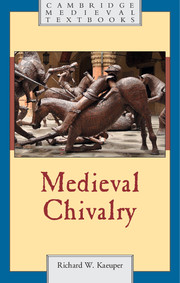Book contents
- Frontmatter
- Dedication
- Contents
- List of figures
- Acknowledgments
- Part I An approach to chivalry: was it real and practical?
- Part II Three broad chronological phases
- Part III The privileged practice of violence
- 6 Chivalry and war
- 7 Tournament
- Part IV Chivalry, governing institutions, and ideals
- Part V The world of chivalric emotions
- Reflections
- Select Bibliography
- Index
7 - Tournament
from Part III - The privileged practice of violence
Published online by Cambridge University Press: 05 August 2016
- Frontmatter
- Dedication
- Contents
- List of figures
- Acknowledgments
- Part I An approach to chivalry: was it real and practical?
- Part II Three broad chronological phases
- Part III The privileged practice of violence
- 6 Chivalry and war
- 7 Tournament
- Part IV Chivalry, governing institutions, and ideals
- Part V The world of chivalric emotions
- Reflections
- Select Bibliography
- Index
Summary
A revival of jousting has become a feature of the medieval or Renaissance fairs that now dot the summer landscape of the United States, drawing large crowds especially to watch colorful combats between fully armored knights while enjoying a roast turkey leg and quaffing mead. Usually the jousting is sadly false and scripted to ensure victory by the obvious hero, but the sheer physicality of armored men atop snorting, stamping horses remains impressive enough; and on one occasion it elicited from my watching granddaughter (at age 4) a series of questions pertinent to this chapter: “Why are they doing this? Are they having a quarrel? Are they going to do it again?” Her conclusion revealed genuine concern: “Perhaps we should talk to them.” This chapter at least talks about them, or rather their authentic medieval predecessors, drawing on the careful work of numerous scholars such as David Crouch, Juliet Barker, and Richard Barber.
We must grant, however, that they would have been surprised by these queries, for over centuries tourneying seemed natural and self-justifying to them. Early in the massive fourteenth-century romance Perceforest, Alexander the Great, improbably portrayed as the founder of an English kingdom, descends on an exploratory quest into the sea within a large glass barrel towed behind a ship. His great discovery is swordfish that “tourney and battle with one another so fiercely that it was a wonder to behold, exchanging mighty blows.” Alexander sees they are well equipped for such extreme sport, “having a head shaped like a helmet with a shield behind and a sword clutched by the pommel before.” As a natural phenomenon, this martial play can be read from the created universe and usefully implemented in human society; knighthood can engage in it enthusiastically as a defining chivalric activity. The result is that “the noble king was inspired to establish a similar sport between his knights so that in times of peace and rest they could practice fighting without killing and in times of war be the readier to inflict damage on their enemies and defend themselves if attacked.”
This sport, the text continues, could be called “the school of prowess.” There must be careful rules to exclude treachery; blunted weaponry only should be used; and no one must hit a man from behind when he has lost his helmet.
- Type
- Chapter
- Information
- Medieval Chivalry , pp. 208 - 232Publisher: Cambridge University PressPrint publication year: 2016



